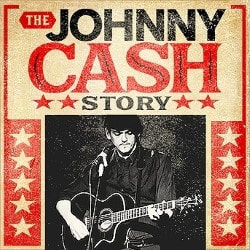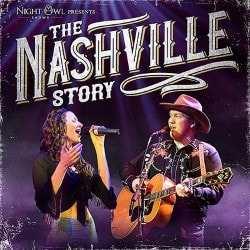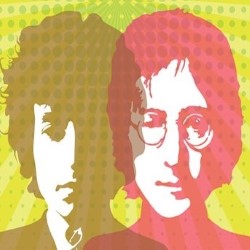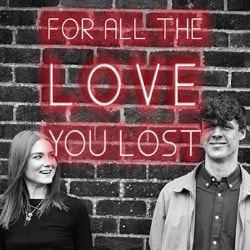|
The Johnny Cash Story from Night Owl Shows featuring Jamie Rodden is only on for three nights (Aug 26 – 28) at theSpaceUK, so if you are a fan of either Johnny Cash or Jamie Rodden, make sure you buy your ticket soon.
Johnny Cash aka “The Man in Black” was a complex man during his lifetime who was famous for his music and iconic choice of colour for both his clothing and his guitar. That “black” was also at times inside Johnny Cash, interwoven into his soul, and it took him at times to places that most of us hope that we will never have to visit in our lifetime, and it is perhaps because of that emotional range of colours between lightness and darkness that so many people found something in common with the man and his music. This show is not Jamie Rodden pretending to be Johnny Cash, but someone who obviously feels a resonance with his life, and perhaps at times is a sharer of that darkness. That is perhaps what gives some of the music in this show so much power, as it forces many of us to confront our own inner demons that we would rather turn around and walk away from. This was not the easiest audience for Jamie tonight, and to say that they were at times “reserved” would probably sum up the opening numbers of the show, and slowly I found myself (as did many of the audience) warming to just how special being on stage and sharing the emotions of these songs was to Jamie Rodden. Any Johnny Cash show is going to have to have some obvious audience pleasers in the set list, and they are here, so is one of my favourite Johnny Cash songs – “Sunday Morning Coming Down”, which was written by Kris Kristofferson (who I saw doing this live a few years ago now), and Jamie captures this one well. Two songs stole this show for me though, “Hurt”, originally written by Trent Reznor of The Nine Inch Nails and the redemptive “When The Man Comes Around”. Both these songs obviously have a raw emotional connection to Jamie and if I could offer one piece of advice it would be to never apologise for the way a song can affect you either by the power of its music or its words (or both). This is the magic, this is the power of music and words, and both can take you from euphoric happiness to deepest of despair (often in the same song). In the end, what is the point of writing, or performing any music if you have no emotional response to it? Keep feeling the music and the words Jamie Rodden and your audience will keep feeling their own experiences to that music too. Review by Tom King (c) 2021 ARTS REVIEWS EDINBURGH The Nashville Story from Night Owl Shows is a gentle introduction to the history and the music of the home of Country Music. Through the talents of Dan Clews (vocals & guitar), Alex Beharrell (vocals, guitar, and a little bit of stand-up comedy) and Hannah Richards (vocals) we get a selection of songs from the very start of Nashville music when it was a promotional radio show for a local insurance company, through the Grand Ole Opry days and all the way up to modern times.
Along our journey we met, amongst others, the music of Hank Williams, Patsy Cline, Tammy Wynette, John Denver, Merle Haggard, Willie Nelson and a few more that could be fitted into this 50 minute or so show format. I have to admit to not being a massive fan of some country music stars and it was obvious with the almost instant connection that our trio had with their audience this evening that many knew some of the songs far better than I did. Country/Nashville music has for me always been in the writing of the songs and there are simply some wonderfully written songs in the history of this music, and few musical genres know how to put real life people and real life emotions into songs better than country music writers, and that was obvious in some of the songs in this show. I hope “the boys” take no offence here, but for me Hannah Richards stole the show vocally, particularly on her versions of the Tammy Wynette classic “Stand By Your Man” and Patsy Cline’s “It Wasn’t God Who Made Honky Tonk Angels”. As with any Night Owl Show that I have been to, there was warmth to the show that is always nice to be a part of, and our on-stage trio were obviously having a lot of fun tonight putting both their musical skills and when needed their ad-libbing skills to good use; you have to be good to run with whatever direction the audience is moving in on any show, and our Nashville Story tellers made it all look so casual and easy this evening. Review by Tom King (c) 2021 ARTS REVIEWS EDINBURGH “When Judas Met John” is an interesting show concept by Irish duo Brothers Broke in which we lightly examine how two of the 20th century’s musical icons – Bob Dylan and John Lennon - related to one another and were at times influenced (even if not recognising it always) by one another.
The title takes its name from an audience member shouting out “Judas” to Bob Dylan when he performed at the Newport Folk Festival in 1965 and to some folk people there committed the unforgivable heresy of playing an electric guitar. That first “electric” song was “Like A Rolling Stone” and Dylan’s musical sound (and a lot of folk music) was changed forever. The John in the title is of course John Lennon. How heavily were “Judas and John” influenced by each other’s music at some level? A few of those questions are answered by our on-stage duo tonight, and that itself is part of the problem in writing this review as if I list too many songs here that kind of spoils the surprise of the show for anyone still to go. A lot of the connections here are better known ones, so I am giving nothing away (I hope) by mentioning perhaps one of the most often quoted ones – Bob Dylan’s response with “Fourth Time Around” to The Beatles’ (well really John Lennon’s) “Norwegian Wood”. Yes, the two songs certainly have similarities, but they also have many differences. Was Dylan really taking aim at Lennon’s changing writing style in the lyric of this song? Who will ever really know (apart from Dylan)? There are, as we find out, other musical similarities between songs in this show, but again it would be nice to balance this by also looking at how different they are too. Oddly, it took Dylan until 2012 to finally acknowledge John Lennon’s enduring status (long after his death) in the song “Roll On John”. Some of the original songs in this show have complex studio productions that are impossible to re-create in the format of this show so, by default, many of the songs here are stripped down to their basic elements and sometimes that works well, other times not so well. There is also going to be this fine line in a show like this of making it entertaining for an audience just out for a night and wanting to listen to some songs and some other people (like myself) who would like a more detailed deconstruction of the music. This show does however need a few tweaks to its presentation which at times is a little “flat”. I would like our duo to tell us a bit about who they are at the beginning and tell us, the audience, why they are attracted to the music of Bob Dylan and John Lennon. Both men obviously share a passion and respect for this music, but somehow that is not being shared with the audience at the level it should be. Having said that though, the format does appear to be working as the venue was pretty much a sell out and the audience were obviously enjoying the show. Review by Tom King (c) 2021 ARTS REVIEWS EDINBURGH “For All The Love You Lost” is a production from Morosophy Productions. The cast and crew are made up from both students and graduates from Royal Holloway University of London. The dictionary definition of morosophy is “foolish pretence of wisdom”, but perhaps no one truly has wisdom at all, pretending or otherwise.
The first thing that struck me about this production was the script, this is a word driven performance and that always interests me as this is not a casual sit down and be “amused” for 50 minutes or so show, the detail is in the words and you have to pay attention to all of them because “For All The Love You Lost” is asking a lot of big questions to which there are simply no definitive (or otherwise) answers. At its surface we follow two young people (Alex and Harriet) getting ready for their first date which has been arranged online. Both are nervous of the meeting and both have their own emotional scars of the past to deal with before and during this meeting. Both are trying to come to terms with the loss of “love” in very different circumstances and both are afraid of being hurt again. A small cast of support characters are in this production, but again they are all asking questions too, and often getting no answers to guide them. The importance of having family and friends to support you during an emotional (or other) crisis in your life is clearly stated here, but also we enter the far darker realms of the human psyche. What if you are not supporting the person who is supporting you? What if you are missing something? What if what you are seeing in someone is an illusion, nothing more than Smokey Robinson’s “Tears of A Clown”. A few things interest me in this production, but one of them is just how reliant a generation of people have become on being able to call someone on their mobile phone at any time they need to. The social media and mobile technology aspect of modern life is lightly touched upon here, but it is changing how we interact socially as people are potentially constantly connected to each other now and how you use or abuse that can have ongoing consequences in your life. For myself, I can’t imagine a world where someone intrudes upon your date with someone with a phone call. There are so many big questions being asked in this production that our main story line at times becomes nothing more than a back-drop, and that was maybe not intended that way. Is there a reason to us being here? Who can answer that question, let alone even attempt it in a 50 minute show. This is a very good script with a lot of shades of emotion in it. Sometimes though, those shades of emotion are not coming over to me in the body language or the voices of the cast, sometimes these are just words to them. Loss is more than an emotion, it is a physical state of being. There is, despite the darker shades of emotions here, a lightness to this production, an optimist’s view of life that things will get better, that there is light at the end of the tunnel. Perhaps this view of life is why they get so upset when bad things happen, perhaps the pessimists are better prepared for life’s misfortunes and genuinely surprised when things turn out right. Sometimes you just have to accept that that light at the end of the tunnel might actually be the 12.15 express train heading right towards you! Review by Tom King (c) 2021 ARTS REVIEWS EDINBURGH As a long time admirer of the works of the Pre-Raphaelite Brotherhood, and Dante Gabriel Rossetti in particular, this production immediately caught my eye in theSpaceUK’s programme, and I was interested to see how three of the most important women in Rossetti’s life would be portrayed.
Fanny Cornforth (played by Julia Munrow), Lizzie Siddal (Emma Hopkins) and Jane Morris (Sarah Archer) were very different women from very different backgrounds, but they were all painted by Rossetti, and were also his lovers, with Lizzie eventually, after an extremely long engagement, becoming his wife. This play depends entirely on the acting skills of the three women involved, with no props other than an easel with a painting or drawing on it (which the audience doesn’t get to see), so it required an ability to get completely into the characters, which was accomplished to great effect. Lizzie’s disbelief and anguish at the thought that Rossetti might have a lover, when she was his adoring fiancée, was beautifully portrayed, as was Jane Morris as the hoity toity socialite who was secure in her marriage to William Morris, whilst still yearning for and having an affair with Rossetti. For me, however, the show was entirely stolen by Fanny Cornforth, the feisty prostitute who Rossetti painted and slept with, who had some wonderfully funny put-down lines, and actor Julia Munrow seemed to be enjoying every moment of it. This was the first performance of this show at this year’s Fringe and, if the applause at the end was anything to go by, the audience enjoyed it every bit as much as I did. If you’re a Rossetti fan, don’t miss this show. Even if you’re not a Rossetti fan, go along and learn more about the intimate life of one of the greatest English artists of the 19th century. Review by Lisa Sibbald (c) 2021 ARTS REVIEWS EDINBURGH |
AuthorWrite something about yourself. No need to be fancy, just an overview. Archives
December 2021
Categories |








 RSS Feed
RSS Feed